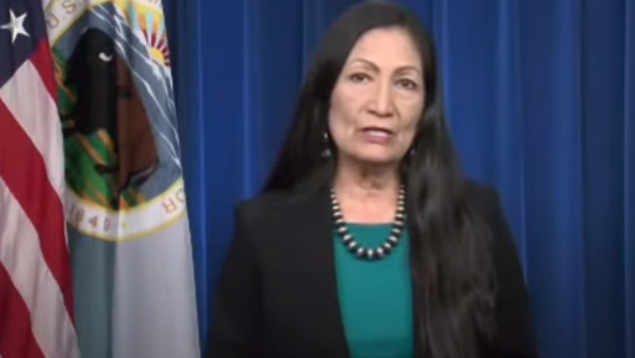
- Details
- By Jenna Kunze
Next week, Secretary of the Interior Deb Haaland and Assistant Secretary Bryan Newland will visit Caddo County, Oklahoma to conduct their first listening session in the Road To Healing Tour, the Department of the Interior’s initiative to hear from survivors of Indian Boarding Schools.
The listening session is set to take place at 10am on July 9. No specific location was announced.
Trauma-informed support will be available for survivors sharing their stories.
Only the first hour of the event will be open to the media, followed by a private listening session. A transcript will be available in the weeks following the visit.
Haaland announced the Road the Healing Tour last month, in conjunction with the release of Volume 1 of the Federal Indian Boarding School Initiative. The report, penned by Newland, recommended connecting with Indigenous communities and hearing about their experiences in boarding schools directly.
Following Oklahoma, Secretary Haaland will travel to Hawai’i, Michigan, Arizona, and South Dakota as part of The Road to Healing tour in 2022. Additional states will be announced for 2023.
The greatest concentration of Federal Indian boarding schools were in present-day Oklahoma, according to the federal investigation.
More Stories Like This
Native News Weekly (August 25, 2024): D.C. BriefsMonday Morning: (February 16, 2026): Articles You May Have Missed This Past Weekend
US Presidents in Their Own Words Concerning American Indians
Osage Nation Mourns the Passing of Former Principal Chief Jim Gray
Native News Weekly (February 15, 2026): D.C. Briefs
Help us defend tribal sovereignty.
At Native News Online, our mission is rooted in telling the stories that strengthen sovereignty and uplift Indigenous voices — not just at year’s end, but every single day.
Because of your generosity last year, we were able to keep our reporters on the ground in tribal communities, at national gatherings and in the halls of Congress — covering the issues that matter most to Indian Country: sovereignty, culture, education, health and economic opportunity.
That support sustained us through a tough year in 2025. Now, as we look to the year ahead, we need your help right now to ensure warrior journalism remains strong — reporting that defends tribal sovereignty, amplifies Native truth, and holds power accountable.
 The stakes couldn't be higher. Your support keeps Native voices heard, Native stories told and Native sovereignty defended.
The stakes couldn't be higher. Your support keeps Native voices heard, Native stories told and Native sovereignty defended.
Stand with Warrior Journalism today.
Levi Rickert (Potawatomi), Editor & Publisher


